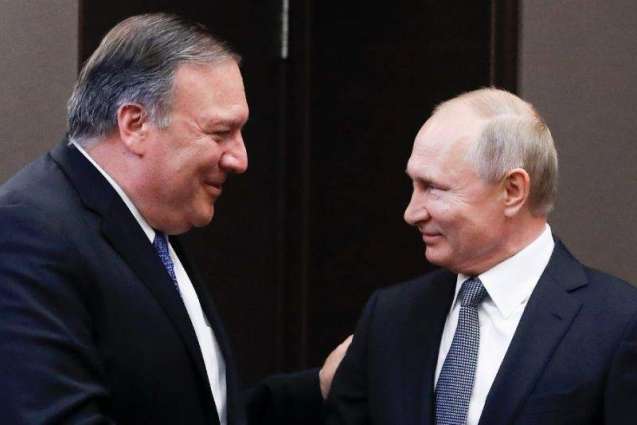US State Secretary Mike Pompeo's visit to Russia may mark the restart of a formal dialogue between the two nations, but a turnaround should not be expected before or in the immediate aftermath of the 2020 US presidential election, Earl Rasmussen, the executive vice president of the Washington-based think tank Eurasia Center, told Sputnik
MOSCOW (Pakistan Point News / Sputnik - 15th May, 2019) US State Secretary Mike Pompeo's visit to Russia may mark the restart of a formal dialogue between the two nations, but a turnaround should not be expected before or in the immediate aftermath of the 2020 US presidential election, Earl Rasmussen, the executive vice president of the Washington-based think tank Eurasia Center, told Sputnik.Pompeo paid his first visit to Russia as state secretary on Tuesday. During separate meetings in the resort city of Sochi with Russian President Vladimir Putin and Foreign Minister Sergey Lavrov, the officials discussed a wide range of security-related issues, including the situations in Syria, Iran and Venezuela, agreed to continue a dialogue on arms control and expressed hope for improving bilateral relations.
The US state secretary described the meetings as "a positive step forward" and urged Russia to "work with us to change the trajectory of the relationship for the benefit of both nations."
Kremlin aide Yury Ushakov, in turn, noted that even though a breakthrough in relations was not yet in sight, the United States had shown signs of having a constructive approach toward their improvement.
US POLITICAL SQUABBLE WILL GO ON
According to Rasmussen, the start of the long-awaited "formal dialogue" is actually "the most positive result" of the Sochi talks, while expectations for any turnaround are premature.
"Despite talk of beginning to mend relations, I do not see a major shift until after 2020 elections and most likely beyond. But that said, any dialogue which may diffuse if not reconcile tensions is good. I think the most that can be expected is to have an open dialogue. Despite the lack of evidence regarding 'Russian election meddling,' the political landscape will not allow anything but a continuation of accusations from the US and warning about 2020," Rasmussen said.
He also pointed to the fact that the US allegations of Russia's interference in the 2016 presidential election "comes from a country that has meddled in more countries' elections and internal affairs than any other, from a country that has a reputation of overthrowing countries that may not bend to their will regardless of whether the country is democratic or not."
"'Democracy' and 'Human Rights' are not an issue but rather instruments of propaganda to justify aggressive actions," he said.
DIRECT TALKS BETTER THAN NEWS BITES, TWITTER FEEDS
During his meeting with Putin, Pompeo expressed the belief that, despite disagreements, there were "truly overlapping interests" that the two countries could build on before establishing productive cooperation. He also indicated that President Donald Trump wanted to strengthen bilateral ties not only for the benefit of both nations but also that of the rest of the world.
Reiterating that "any degree of dialogue is good," Rasmussen doubted that the sides would manage to remove "major disagreements" in certain areas.
"Despite the rhetoric, I think Mr. Pompeo knows the situation and causes of current tensions. Yes, both countries have different objectives and interests and these will likely remain for the foreseeable future. In general meetings are good, whether anything comes from them or not. Direct dialogue versus news bites and twitter feeds are the basis of true diplomacy. Perhaps Mr. Pompeo was able to learn something from Mr. Lavrov regarding diplomacy but I will not hold my breath," he said.
Richard Sakwa, a professor of Russian and European politics at the University of Kent, agreed that the fact the meeting had even taken place was already a win for the strained bilateral relations.
"In brief, there was no breakthrough, other than the fact of the meeting itself - which I think is an important signal that some sort of normal diplomatic relationship is being re-established, after the trauma of the Russiagate investigation. I had lower expectations, so the business-like atmosphere is to be welcomed," Sakwa told Sputnik.
He added that "there is a long way to go" to return relations to "some sort of normality" in the wake of the Russian meddling scandal, noting that the clear wish of both leaders to improve ties was a "good basis for further talks."
Speculating about the potential results of a relaunched US-Russia dialogue, Rasmussen suggested that it still could produce some breakthroughs with regard to Afghanistan, Syria and North Korea as "there is room for a common perspective and overlapping interests in those regions."
LITTLE ROOM FOR UNDERSTANDING ON UKRAINE, VENEZUELA
In contrast, disagreements around Venezuela and Ukraine are likely to remain major irritants in relations.
"We will see what occurs with Ukraine post presidential elections and the pending replacement of the US Ambassador to Ukraine. However, the Rada [parliamentary] elections later this year will play a key role on whether President [Volodymyr] Zelensky will be able to seek to mend bridges," Rasmussen said.
Professor Sakwa, in turn, put both Venezuela and Syria on the list of multiple issues where "still, there is an enormous gulf between the two sides."
Rasmussen, meanwhile, went on to note that the situation around the Iran nuclear deal and the Tehran-Washington standoff in the region also remained a "key area of concern" for both Russia and Europe.
"Left to the US, Israel and Saudi Arabia war could easily erupt which would be devastating for the region. Despite the rhetoric, I do not expect the US to seek a direct confrontation with Iran before the elections. After, based on our current Foreign Policy Team, I would not want to take a guess," he said.
The expert, however, expressed hope that international tensions would subside and the United States would ultimately manage to "keep their internal political issues internal."




